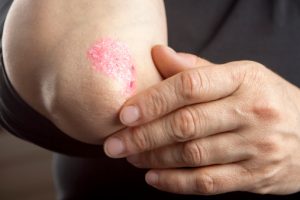
Below you will read about treatments for many common skin ailments, complications that may arise, and ways in which our skin reflects our state of health.
Psoriasis skin inflammation treatments improve heart disease symptoms: Study
Psoriasis skin inflammation treatments improve heart disease symptoms by blocking the immune system response that causes inflammation. It is estimated that 7.5 million Americans have psoriasis. Although it is a skin condition, the effects of psoriasis run deep. In fact, psoriasis is a known risk factor for heart disease.
Jashin J. Wu, director of dermatology research at the Kaiser Permanente Los Angeles Medical Center, said, “People with psoriasis, particularly those with more severe disease, have an increased risk for a variety of other health problems, including obesity, diabetes, high blood pressure, high cholesterol, stroke, and heart attack. Psoriasis patients, even those with mild disease, need to be aware of how this condition affects their overall health.” Continue reading…
The effects of eczema span beyond the skin surface. In fact, a new study suggests that eczema sufferers are more likely to experience other medical conditions, including heart disease.
Eczema causes dry, red, itchy patches on the skin. Researcher Dr. Jonathan Silverberg said, “Although it affects the skin, eczema is not just skin-deep. This disease can have a serious impact on patients’ quality of life and overall health, both physically and mentally.”
Eczema has been linked to asthma, hay fever, heart disease, food allergies, obesity, and fever. Continue reading…
n vitiligo, skin transplant surgery can be effective for restoring skin pigmentation, according to research. Vitiligo is a condition in which the skin stops producing melanin responsible for skin pigmentation. This causes white patches to appear on the skin.
For the study, researchers followed 23 patients for up to six months after the skin transplant surgery. They found that the treated area regained 43 percent of its natural color. In eight of the participants, pigment was restored 68 percent on average.
The surgery involves taking healthy skin cells from one part of the body and transplanting them to the affected area. Continue reading…
Sure, having acne in your teen years was probably a devastating experience, but new findings suggest a history of acne may indicate your skin may be aging slower now that you’re older. The study included over 1,200 twins, with one-quarter of them struggling with acne at some point.
Lead researcher Dr. Simone Ribero said, “For many years, dermatologists have identified that the skin of acne sufferers appears to age more slowly than in those who have not experienced any acne in their lifetime. Whilst this has been observed in clinical settings, the cause of this was previously unclear. Our findings suggest that the cause could be linked to the length of telomeres, which appears to be different in acne sufferers and means their cells may be protected against aging.” Continue reading…
A recent study published in the September issue of the Journal of the American Academy of Dermatology indicates that cold sores and psoriasis rule the roost when it comes to stigmatized skin conditions. However, experts believe the sufferers are victims of misguided ill will.
According to the National Psoriasis Foundation, psoriasis, which is believed to be caused by genetic and environmental triggers, is the most common autoimmune condition in the United States. About 7.5 million Americans suffer from psoriasis.
On the other hand, cold sores are caused by a virus and typically get cured within days. The sores vary in size and appear on or near the lips. Like with psoriasis, millions of Americans are affected but, unlike psoriasis, cold sores are contagious to the touch. Continue reading…